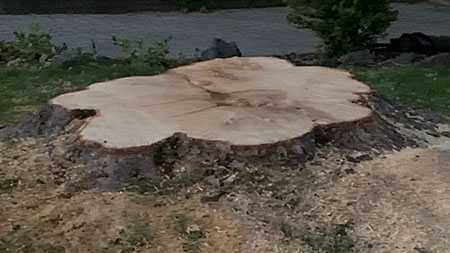With my journal, coffee, and water in hand, I head to my morning spot to start my day with reflection, review, adjustment, and planning. I have built a comfy, serene spot in front of the bay window of my living room that has just enough lighting and a view I love. The gorgeous trees and vast skies of nature provide a calm, beautiful setting to start my day. It doesn’t matter if the sun is shining and warming me up, rain is hitting the roof and calming me, or the excitement of snow is covering the landscape. It is my spot. A great deal of writing, reflection and even crying through feelings happens here. It is “my” spot.
I settled in and sat back with my first sip of coffee and looked up to see what beauty the world would share out my window today. But I was startled to see a cold, empty view of the street and houses. Suddenly, I remembered last night when I came home, I drove by my neighbor’s house and my favorite tree was gone. Apparently, I had not connected the impact it would have on my morning.
I was uncomfortable, angry, confused, and wondering why I had not been consulted. (Skill #1: feel the feelings.) How dare someone make a decision that impacted my day without talking to me. (Insert a big eye roll here.) This was not right. What the heck?
Can you see the signs of a self-proclaimed drama queen and victim?
I popped up and paced around my living room. A part of my day that I work so hard to protect was changed, due to something I had no control over. The feelings were real and I felt thrown. I sat back down in a different spot and continued my morning but was so aware of the annoyance and the loss of control pulsing through me. I stayed focused on what I know I need to do to keep the rest of my day on track. (Skill #2: stay a priority regardless of things out of your control.)
Later that day I shared my experience with others (#3: surround yourself with like-minded peeps) and was met with suggestions and advice about what actions I could take to respond to my spot being altered. (#4: tell others and receive support.) I appreciated the support and thanks to several years of practicing these skills, I had already scoped out the change in my routine (#5: focus on what I do control) that would still provide me with the same serene moment to focus on planning my days. (Skill #6: planning no matter what.)
Does all of this sound like an overreaction to a tree? Most likely, yes. But it also shows a great example of what I want to share with you. This is exactly how you have to start practicing your new skills. Step back and think about your day. What is happening that you have no control over, but where your reaction includes complaining, wondering why your life is so hard, and justifying your day being so thrown off you cannot follow through with the things you planned. Which in blunt terms means you choose to eat crap and once again set your self-care aside. This leads to, “I’ll start again tomorrow.” Back on the merry-go-round over and over again. Sound familiar?
Friends, you can change this. These life challenges are the opportunities to practice your skills and change the habits that are holding you back. If your reaction to everyday minor life challenges — a flat tire, broken appliance, change in schedule, sick child…life, basically — is crying, isolation, “why is my life harder than anyone else”, and comfort through food or other unhealthy vices, then I want to help you. You are trying to control the wrong aspects of your life. You do have control of how you respond to situations in life and you will take that control once you start practicing by taking baby steps.
You are surrounded by information and inspiration telling you how to make changes, but if you are just watching from the sidelines like the newest trend on Netflix, you are not likely to have the results you desire.
Losing the tree outside my window is just one example of how the tools I provide in my book, workshop, and coaching can be applied to the smaller life challenges that we let impact our day out of frustration and lack of control. It really can be as simple as applying these skills to the daily mishaps that you have no control over, and before you know it you will be applying those skills and tools to the larger stressors in your life. But I realize in that statement of “it can be that simple” that for so many of us we need more help.
Recently, I realized that when you are feeling vulnerable, uncomfortable, and working so hard to navigate through all of the information, that I could help you even more. That is why I am now offering Small Group Coaching. This small group coaching will help you continue to take steps to end your toxic relationship with food and also provide you the information, tools, and support to stay on track each day as you navigate life challenges. This is an investment in creating a lifestyle that leads to your vision of a healthy mind, body, and soul.
When you sign up for small group coaching, you will receive:
-
Each group is limited to 8 participants for four, one-hour, small group coaching sessions
-
A Facebook group of members who are also participating in small group coaching. You will continue to have access to this group after your sessions are over. It will include content from me that will not be shared on my other social media platforms or workshops and will include live videos and even guests to share resources with you. This is also where you can share your intentions for the week and post how it went.
-
Voice messages through the week via a phone app (Voxer) that are uplifting, thought-provoking, and supportive reminders to remind you to stay focused, take leaps, and encourage you through uncomfortable steps.
-
Coaching workbook to provide you with space to write your vision, intentions, capture the work we do each week, and celebrate your action. In addition, it will have a toolbelt checklist, song list, and resource page.
Seats are limited. Take the next steps and make an investment in YOU. Sign up for small group coaching today.

